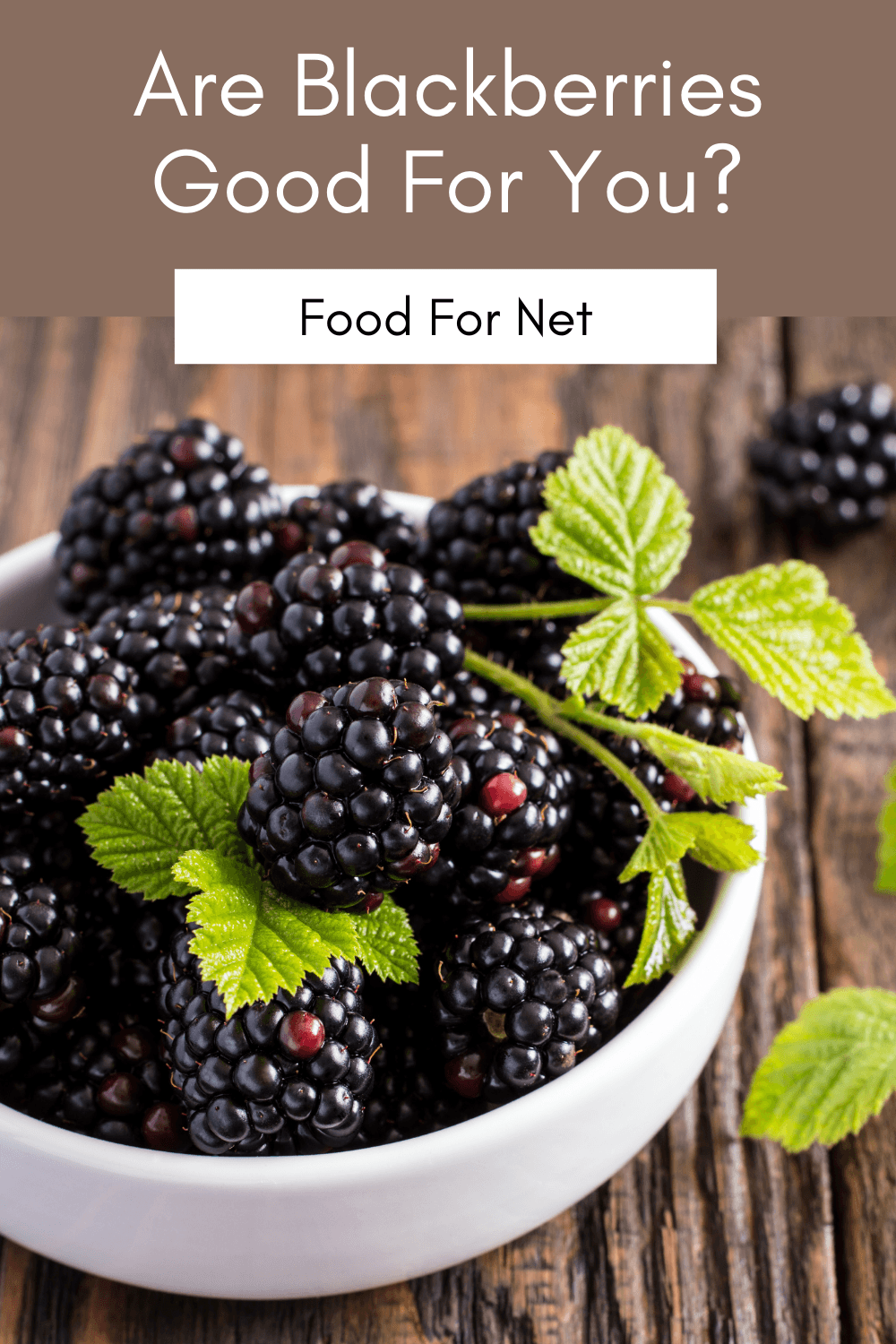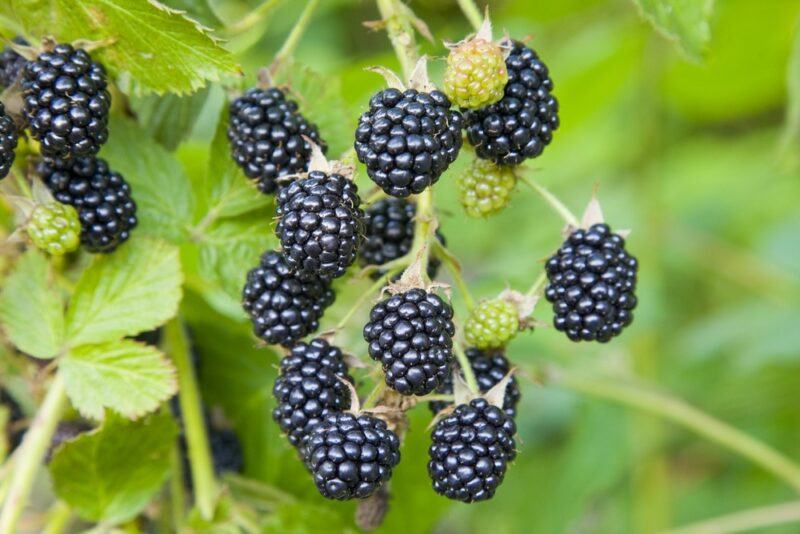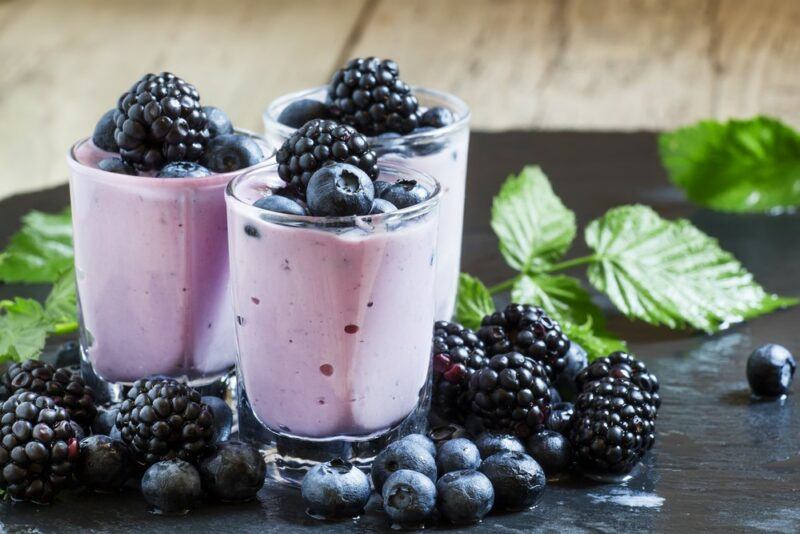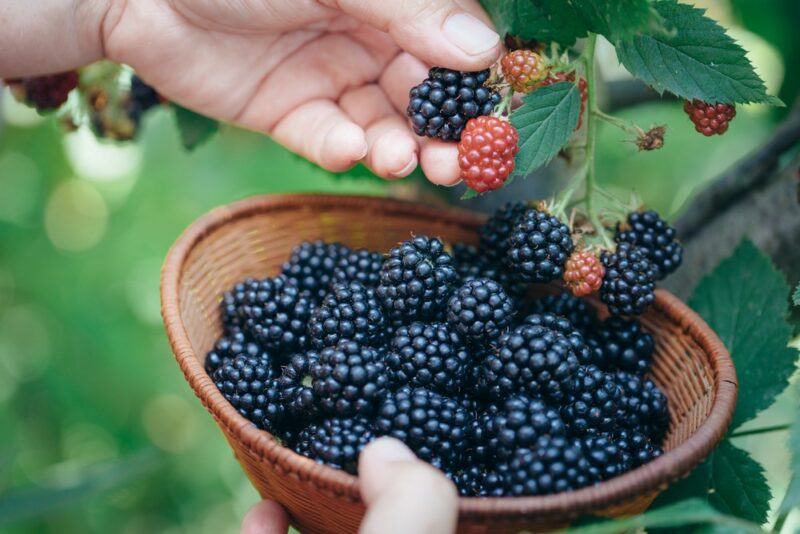
When we talk about berries, blueberries and strawberries often steal the show. Yet really, blackberries are just as amazing, if not more so. They have an amazingly sweet and tart flavor profile that works well with countless desserts, not to mention their fantastic color. So, what about the health side of things? Are blackberries good for you or do they pale in comparison to other famous berries?
Well, first of all, fresh fruit always offers benefits. It doesn’t matter what type you choose, you’re always some important nutrients, along with fiber and antioxidants. And, as it turns out, berries are particularly powerful.
Blackberries also have some interesting features that can be very relevant for your health.
Are Blackberries Good For You?
- Benefits Of Blackberries
- How Blackberries Could Be Harmful
- Blackberries Versus Blueberries
- Final Thoughts
Benefits Of Blackberries

Their High Fiber Content
You always get some fiber with fruit and vegetables, there’s nothing special about that. But, blackberries are exceptional for fiber, with a cup of them giving you a whopping 7.6 grams of fiber.
That’s close to a third of your daily fiber needs from a single cup of fruit.
While fiber might sound boring, it isn’t something to take for granted. This macronutrient has been linked to many benefits, including decreased cholesterol levels and better blood sugar management. What fiber is most famous for, however, is its impacts on your digestive system.
Specifically, fiber helps to bulk out your stools, keeping everything moving through well. Not getting enough fiber can lead to side effects like constipation, bloating, inflammation, and fatigue.
There’s another thing too – despite the range of fiber rich foods out there, many of us aren’t getting enough fiber in our diets. That might be something to do with the modern focus on fiber rich foods. Whatever the reason though, it’s important that we consume more fiber. Berries are an easy way to do so.
They’re A Keto-Friendly Fruit
One fantastic thing about blackberries is their balance of fiber to carbs. In particular, a cup of blackberries contains 7.6 grams of fiber and 7 grams of sugars. This makes blackberries one of the best fruits on a low carb diet (along with raspberries, strawberries, coconut, and avocados).
The low amount of carbs is a huge advantage.
After all, fruits contain many important antioxidants and other plant-based compounds. You’d be seriously compromising your health if you were to cut out all types of fruit. Yet, many fruits contain too many carbs to work well on very low carb diets.
Berries are a fantastic way around the problem. Just watch out for blueberries, as these contain more carbs than other types of berries.
Their Nutrients And Antioxidants
Let’s talk about the nutrients in blackberries for a moment. Berries aren’t as powerful for nutrients as some other fruits and vegetables, but they do still have some interesting features.
For blackberries, the most significant nutrients are vitamin C, vitamin K, and manganese. You get roughly half of your daily vitamin C intake from a cup of blackberries, along with 47% of your manganese target and 36% for vitamin K.
There are smaller amounts of other nutrients present too, like copper, folate, vitamin E, potassium, and plenty of others. Each of these nutrients matters. For example, vitamin C helps with your immune system and wound healing, while manganese is relevant for regulating blood sugar and in nerve functioning.
Blackberries are an excellent source of antioxidants too, partly due to their anthocyanin content.
As the name suggests, antioxidants help to reduce oxidation in our bodies. This is a critical effect, as too much oxidation can cause significant harm. In some ways, having an antioxidant rich diet is just as important as having one that’s rich in vitamins and minerals.
The antioxidants could even help with your brain health. This includes reducing memory loss that happens as you age. Berries aren’t a magic cure-all here, of course, but they could still help (and certainly won’t hurt).
Can Reduce Inflammation

The plant-based compounds in blackberries have other effects too, including the potential to decrease inflammation. Like oxidation, inflammation is a natural process, one that helps our bodies to respond to infection and injury.
However, inflammation doesn’t always work as it should. Modern diets and lifestyles may promote chronic inflammation, which is thought to increase the risk of a variety of diseases. Foods that help decrease inflammation, like blackberries, are a critical way to bring our bodies back into balance.
Decreasing your intake of inflammation causing foods and focusing on anti-inflammatory foods instead could lead to many health improvements – especially if you stick with the habit.
Low In Calories And Fat
Like most types of fruit, blackberries are naturally low in fat. They’re not bad for calories either, with a cup of the berries only containing 60 calories or so.
Both of these features could be helpful when you’re trying to lose weight. Why not have a handful of blackberries as a snack instead of something processed? The fiber in the blackberries should help to keep you satisfied, while you’re getting plenty of antioxidants at the same time.
Can Improve Blood Sugar Response
Fruit is a significant source of sugar, so it might seem like a poor choice for your blood sugar levels. Yet, in practice, whole fruit is a help instead of a problem.
The main reason is that you’re getting plenty of fiber. The fiber helps to offset the impacts of the sugar, dampening any shifts to your blood sugar levels. In fact, blackberries have a glycemic index (GI) of just 25 and a very low glycemic load as well.
There’s even the chance that eating whole fruit regularly helps to decrease your risk of type 2 diabetes and protect against diabetic complications. That’s pretty exceptional for a delicious berry, right?
Can Promote Heart Health

Berries, of all types, are linked to improved heart health. In particular, they help to improve a variety of heart disease risk factors, including lowering blood pressure and decreasing cholesterol levels. They may decrease the risk of blood clots as well.
Many of these benefits are linked to the antioxidants in berries, although the fiber may play a role as well.
They Fit Into Most Diets
Berries are also incredibly versatile. You can fit them into almost any type of diet, including keto, paleo, and various weight loss approaches.
The main exception is people who need to keep their fiber intake low. This can be the case if you have a condition that makes digesting fiber difficult. Some people with irritable bowel syndrome might need to avoid blackberries (more on that shortly), but other types of berries should still be fine for them.
They’re Low In Oxalates
Blackberries are also low in oxalates, coming in at around 4 milligrams of oxalate in a whole cup of the berries.
Our bodies naturally get rid of oxalates without a problem most of the time. However, they can’t always do this well, especially if your oxalate intake is high. As a result, having too many high oxalate foods can lead to kidney stones in some people.
Thankfully, there are many low oxalate foods. Blackberries aren’t special in that regard.
Still, the low oxalate content is interesting because raspberries contain many more oxalates per serving. Raspberries and blackberries are similar in many ways and are both excellent berries for low carb dieters.
The lower oxalate content of blackberries might be enough to make you choose blackberries over raspberries.
How Blackberries Could Be Harmful
They’re High In FODMAPs
Have you heard about FODMAPs before? The term refers to a collection of sugars, ones that get fermented in our gut and can lead to a host of uncomfortable side effects, including bloating, gas, and stomach cramps.
Thankfully, most people can eat FODMAPs without an issue. You might even get benefits from high FODMAP foods. But, if your stomach is sensitive, high FODMAP foods could easily cause problems.
Blackberries are unusual, as they’re one of the few berries that’s high in FODMAPs (sorbitol is the culprit). In fact, just a single berry per serving might be all you can have on a low FODMAP diet.
Most other berries don’t have this issue. So, if you’re sensitive to FODMAPs, you might want to switch to strawberries or raspberries instead.
The Fiber Can Lead To Side Effects

While fiber is critical for your health, it can also be problematic. Remember how we said that fiber improves your digestion? It does, just not always how or when you want it to.
So, if you have a large amount of fiber at once or suddenly change your fiber intake, you’re likely to get some side effects. These can include gas, stomach cramps, diarrhea, and bloating.
The main way around this is to be gentle. Increase your fiber intake gradually and drink plenty of water.
This also means that you shouldn’t eat large amounts of berries at a time. A few cups of berries, for example, could easily lead to stomach cramps.
Don’t forget about your overall fiber intake either. While most of us aren’t getting enough fiber in our diets, some are faced with the opposite problem instead. There is an upper healthy limit to fiber intake too (around 70 grams per day). You might already be getting this if your diet is rich in plant-based foods.
If you’re already getting a lot of fiber, then the fiber in blackberries could easily lead to significant side effects.
Blackberries Versus Blueberries
Blueberries are the poster child for healthy fruit. This reputation is strongly linked to their antioxidant content, as blueberries have an incredibly high score on the ORAC scale (wild blueberries are even higher than their store-bought counterparts).
ORAC values are a measure of the oxidative capacity of foods. High ORAC scores suggest that a given food is powerful at decreasing oxidation, which should make it an amazing way to protect your health too.
Except that ORAC scores aren’t the full story.
For one thing, ORAC only looks at antioxidant capacity in a test tube, which doesn’t tell us much about foods behave in the body. The ORAC score also ignores all the other functions of antioxidants and plant-based compounds. These patterns are why ORAC is no longer officially tested by the USDA and is considered largely irrelevant to human health.
So, let’s take antioxidants and ORAC out of the picture for blackberries versus blueberries. What’s left?
Well, blueberries have been heavily researched and have been linked to benefits like reduced type 2 diabetes risk and improvements to heart disease risk factors. Blackberries haven’t been studied as heavily, but they could offer most of those same benefits.
Blackberries are also higher in fiber and contain fewer carbs, making them useful for low carb diets and times where you need more fiber.
But, blackberries are high in FODMAPs, while blueberries aren’t. So, if you have irritable bowel syndrome or a related condition, blackberries could be a better choice.
In the end, both types of berries contain plenty of nutrients and antioxidants – and are generally good for you. Either one will provide plenty of health benefits.
Final Thoughts
Blackberries come with plenty of benefits and barely any issues to talk about. The amount of fiber they contain and low sugar content is particularly amazing, making blackberries perfect for diabetics and keto dieters.
The main problem is the high FODMAP content, which may lead to symptoms for people with IBS. Thankfully, other berries tend to be low in FODMAPs, so you have plenty of other options. FODMAP sensitivity varies anyway. You might find that you tolerate blackberries well, even if you are sensitive to other FODMAPs.
Frequently Asked Questions
Do Blackberries Have Seeds?
Each of the small drupelets on a blackberry contains a seed. These are larger than the seeds from raspberries and can sometimes be frustrating, but they’re completely safe to eat.
All varieties of blackberries contain seeds. So, if you find seedless blackberry products, the seeds have simply been strained out.
Are Blackberries Sour?
Some varieties of blackberries are tart, while others are much sweeter. Generally, the blackberry varieties you find in stores and local farmers’ markets tend to be sweet.
However, if these berries were harvested too soon they may still be tart. This happens fairly often, as unripe blackberries last longer than ripe ones. They’re easier to ship too.
How Many Blackberries Are In A Cup?
A cup of blackberries generally contains around 15 to 16 blackberries and weighs approximately 5 ounces. That’s just an average, though. Blackberries vary in size, so you might get more or less of them in a cup.
Are Blackberries Acidic?
Blackberries are indeed acidic, with a pH of between 3.2 and 3.6. As a result, blackberries might trigger acid reflux symptoms and make you feel ill.
However, acidic fruits like blackberries tend to have an alkaline effect in your body. This means people following an alkaline diet may still be able to enjoy blackberries and many other types of fruit.
Acid reflux symptoms are also highly individualized. So, while some people with acid reflux need to avoid blackberries, others will be able to eat ripe blackberries without a problem.
What Do Blackberries Taste Like?
Blackberries are rich and juicy, particularly when they are fully ripe. They often have a slight earthy tone that makes them even more interesting and stops them from being excessively sweet.









 Are Prunes Good For You?
Are Prunes Good For You?
Leave a Reply